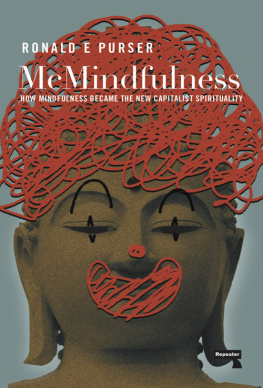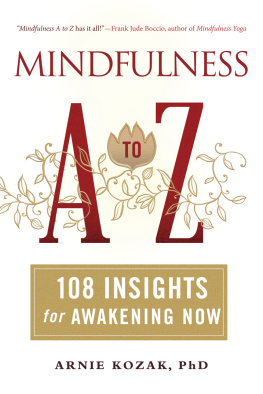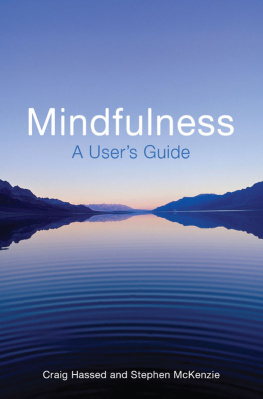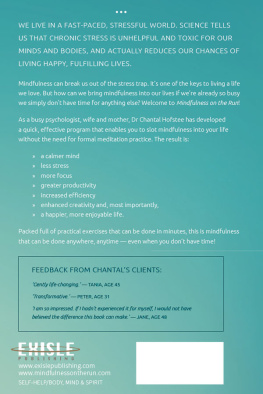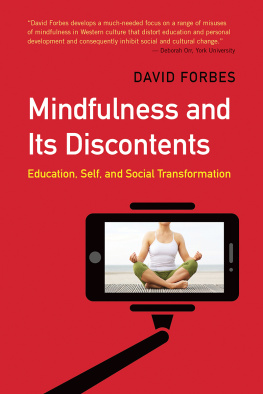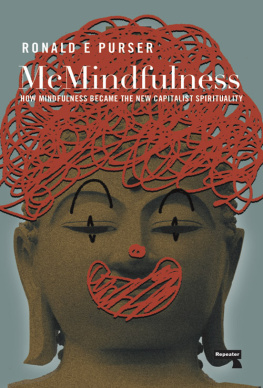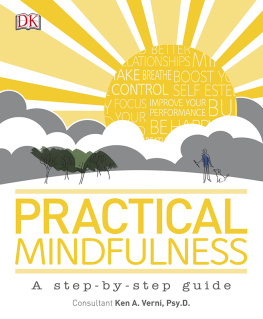McMindfulness
How Mindfulness Became the
New Capitalist Spirituality
McMindfulness
How Mindfulness Became the
New Capitalist Spirituality
RONALD E. PURSER
Published by Repeater Books
An imprint of Watkins Media Ltd
Unit 11Shepperton House
89-93 Shepperton Road
London
N1 3DF
United Kingdom
www.repeaterbooks.com
A Repeater Books paperback original 2019
1
Distributed in the United States by Random House, Inc., New York.
Copyright Ronald Purser 2019
Ronald Purser asserts the moral right to be identified as the author of this work.
Cover design: Johnny Bull
Typography and typesetting: Frederik Jehle
Typefaces: Meriden LT Std, Libre Bodoni, Helvetica Neue
ISBN: 9781912248315
Ebook ISBN: 9781912248490
All rights reserved. No part of this publication may be reproduced, stored in a retrieval system, or transmitted, in any form or by any means, electronic, mechanical, photocopying, recording or otherwise, without the prior permission of the publishers.
This book is sold subject to the condition that it shall not, by way of trade or otherwise, be lent, re-sold, hired out or otherwise circulated without the publishers prior consent in any form of binding or cover other than that in which it is published and without a similar condition including this condition being imposed on the subsequent purchaser.
Printed and bound in the United Kingdom by TJ International Ltd
CONTENTS
CHAPTER ONE:
What Mindfulness Revolution?
CHAPTER TWO:
Neoliberal Mindfulness
CHAPTER THREE:
The Mantra of Stress
CHAPTER FOUR:
Privatizing Mindfulness
CHAPTER FIVE:
Colonizing Mindfulness
CHAPTER SIX:
Mindfulness as Social Amnesia
CHAPTER SEVEN:
Mindfulness Truthiness Problem
CHAPTER EIGHT:
Mindful Employees
CHAPTER NINE:
Mindful Merchants
CHAPTER TEN:
Mindful Elites
CHAPTER ELEVEN:
Mindful Schools
CHAPTER TWELVE:
Mindful Warriors
CHAPTER THIRTEEN:
Mindful Politics
CONCLUSION:
Liberating Mindfulness
NOTES
ACKNOWLEDGEMENTS
chapter one
What Mindfulness Revolution?
Mindfulness is mainstream, endorsed by celebrities like Oprah Winfrey, Goldie Hawn and Ruby Wax. While meditation coaches, monks and neuroscientists rub shoulders with CEOs at the World Economic Forum in Davos, the founders of this movement have grown evangelical. Prophesying that its hybrid of science and meditative discipline has the potential to ignite a universal or global renaissance, the inventor of Mindfulness-Based Stress Reduction (MBSR), Jon Kabat-Zinn, has bigger ambitions than conquering stress. Mindfulness, he proclaims, may actually be the only promise the species and the planet have for making it through the next couple hundred years.
So, what exactly is this magic panacea? In 2014, Time magazine put a youthful blonde woman on its cover, blissing out above the words: The Mindful Revolution. The accompanying feature described a signature scene from the standardized course teaching MBSR: eating a raisin very slowly indeed. The ability to focus for a few minutes on a single raisin isnt silly if the skills it requires are the keys to surviving and succeeding in the 21st century, the author explained.
I am skeptical. Anything that offers success in our unjust society without trying to change it is not revolutionary it just helps people cope. However, it could also be making things worse. Instead of encouraging radical action, it says the causes of suffering are disproportionately inside us, not in the political and economic frameworks that shape how we live. And yet mindfulness zealots believe that paying closer attention to the present moment without passing judgment has the revolutionary power to transform the whole world. Its magical thinking on steroids.
Dont get me wrong. There are certainly worthy dimensions to mindfulness practice. Tuning out mental rumination does help reduce stress, as well as chronic anxiety and many other maladies. Becoming more aware of automatic reactions can make people calmer and potentially kinder. Most of the promoters of mindfulness are nice, and having personally met many of them, including the leaders of the movement, I have no doubt that their hearts are in the right place. But that isnt the issue here. The problem is the product theyre selling, and how its been packaged. Mindfulness is nothing more than basic concentration training. Although derived from Buddhism, its been stripped of the teachings on ethics that accompanied it, as well as the liberating aim of dissolving attachment to a false sense of self while enacting compassion for all other beings.
What remains is a tool of self-discipline, disguised as self-help. Instead of setting practitioners free, it helps them adjust to the very conditions that caused their problems. A truly revolutionary movement would seek to overturn this dysfunctional system, but mindfulness only serves to reinforce its destructive logic. The neoliberal order has imposed itself by stealth in the past few decades, widening inequality in pursuit of corporate wealth. People are expected to adapt to what this model demands of them. Stress has been pathologized and privatized, and the burden of managing it outsourced to individuals. Hence the peddlers of mindfulness step in to save the day.
But none of this means that mindfulness ought to be banned, or that anyone who finds it useful is deluded. Its proponents tend to cast critics who hold such views as malevolent cranks. Reducing suffering is a noble aim and it should be encouraged. But to do this effectively, teachers of mindfulness need to acknowledge that personal stress also has societal causes. By failing to address collective suffering, and systemic change that might remove it, they rob mindfulness of its real revolutionary potential, reducing it to something banal that keeps people focused on themselves.
A Private Freedom
The fundamental message of the mindfulness movement is that the underlying cause of dissatisfaction and distress is in our heads. By failing to pay attention to what actually happens in each moment, we get lost in regrets about the past and fears for the future, which make us unhappy. The man often labeled the father of modern mindfulness, Jon Kabat-Zinn, calls this a thinking disease. Other sources of cultural malaise are not discussed. The only mention of the word capitalist in Kabat-Zinns book Coming to Our Senses: Healing Ourselves and the World Through Mindfulness occurs in an anecdote about a stressed investor who says:
We all suffer a kind of A.D.D.
Mindfulness advocates, perhaps unwittingly, are providing support for the status quo. Rather than discussing how attention is monetized and manipulated by corporations such as Google, Facebook, Twitter and Apple, they locate the crisis in our minds. It is not the nature of the capitalist system that is inherently problematic; rather, it is the failure of individuals to be mindful and resilient in a precarious and uncertain economy. Then they sell us solutions that make us contented mindful capitalists.
The political naivet involved is stunning. The revolution being touted occurs not through protests and collective struggle but in the heads of atomized individuals. It is not the revolution of the desperate or disenfranchised in society, notes Chris Goto-Jones, a scholarly critic of the movements ideas, but rather a peaceful revolution being led by white, middle class Americans.
Next page
